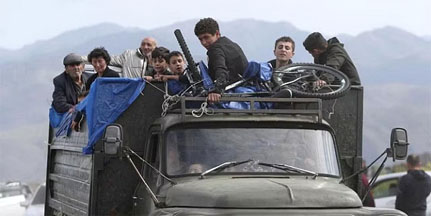TEL AVIV (TIP): Israel has quietly helped fuel Azerbaijan’s campaign to recapture Nagorno-Karabakh, supplying powerful weapons to Azerbaijan ahead of its lightening offensive last month that brought the ethnic Armenian enclave back under its control, officials and experts say. Just weeks before Azerbaijan launched its 24-hour assault on Sept. 19, Azerbaijani military cargo planes repeatedly flew between a southern Israeli airbase and an airfield near Nagorno-Karabakh, according to flight tracking data and Armenian diplomats, even as Western governments were urging peace talks.
The flights rattled Armenian officials in Yerevan, long wary of the strategic alliance between Israel and Azerbaijan, and shined a light on Israel’s national interests in the restive region south of the Caucasus Mountains.
“For us, it is a major concern that Israeli weapons have been firing at our people,” Arman Akopian, Armenia’s ambassador to Israel, told The Associated Press. In a flurry of diplomatic exchanges, Akopian said he expressed alarm to Israeli politicians and lawmakers in recent weeks over Israeli weapons shipments.
“I don’t see why Israel should not be in the position to express at least some concern about the fate of people being expelled from their homeland,” he told AP.
Azerbaijan’s September blitz involving heavy artillery, rocket launchers and drones — largely supplied by Israel and Turkey, according to experts — forced Armenian separatist authorities to lay down their weapons and sit down for talks on the future of the separatist region.
The Azerbaijani offensive killed over 200 Armenians in the enclave, the vast majority of them fighters, and some 200 Azerbaijani troops, according to officials.
There are ramifications beyond the volatile enclave of 4,400 square kilometers (1,700 square miles). The fighting prompted over 100,000 people — more than 80% of the enclave’s ethnic Armenian residents — to flee in the last two weeks. Azerbaijan has pledged to respect the rights of ethnic Armenians. Armenia calls the exodus a form of ethnic cleansing.
Israel’s foreign and defense ministries declined to comment on the use of Israeli weapons in Nagorno-Karabakh or on Armenian concerns about its military partnership with Azerbaijan. In July, Israeli Defense Minister Yoav Gallant visited Baku, the Azerbaijan capital, where he praised the countries’ military cooperation and joint “fight against terrorism.”
Israel has a big stake in Azerbaijan, which serves as a critical source of oil and is a staunch ally against Israel’s archenemy Iran. It is also a lucrative customer of sophisticated arms.
“There’s no doubt about our position in support of Azerbaijan’s defense,” said Israel’s former ambassador to Azerbaijan, Arkady Milman. “We have a strategic partnership to contain Iran.”
Although once resource-poor Israel now has plenty of natural gas off its Mediterranean coast, Azerbaijan still supplies at least 40% of Israel’s oil needs, keeping cars and trucks on its roads. Israel turned to Baku’s offshore deposits in the late 1990s, creating an oil pipeline through the Turkish transport hub of Ceyan that isolated Iran, which at the time capitalized on oil flowing through its pipelines from Kazakhstan to world markets.
Azerbaijan has long been suspicious of Iran, its fellow Shiite Muslim neighbor on the Caspian Sea, and chafed at its support for Armenia, which is Orthodox Christian. Iran has accused Azerbaijan of hosting a base for Israeli intelligence operations against it — a claim that Azerbaijan and Israel deny. (AP)
Israeli arms quietly helped Azerbaijan retake Nagorno-Karabakh, to the dismay of region’s Armenians
